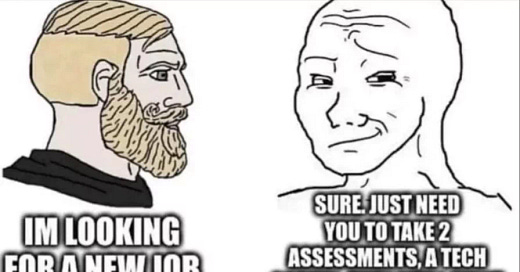Hello!
Thank you for joining me, I’m so glad you’re here.
I had such a great reaction to last week’s newsletter on T Levels! Thank you to those who shared the link. It was a great experience having guests join me, so if you are an expert in early careers and have a topic to come discuss, please do get in touch.
Today’s topic has been bouncing around my brain for a few weeks, so it’s been good to sit down and write it out. Let’s jump straight in!
As with many things, the pandemic totally turned the world of recruitment on its head. Pre-pandemic, it was normal to have a recruiter call, then be invited in for an in-person assessment centre, or interview and there was little variation.
Overnight, recruitment processes had to move online, and a whole catalogue of assessment and selection tools came to the market. From virtual assessment centres, to gamified assessments, to the dreaded one-way-interview, the market is now packed with products that make all kinds of claims, and it can be very difficult for recruiters to know which option suits their needs.
Each option has its own pros and cons, and especially in volume hiring (I have personally experienced numbers such as 100 applicants a day in one situation, and my top spot goes to the graduate roles I recruited for in Dubai where it was easy to reach 1000 applicants over a weekend) these kinds of tools are a necessary evil in some cases - you have to cut the numbers down somehow.
There is also the case that it’s harder to know *how* to assess early career applicants, as they won’t have built up a career yet to demonstrate their abilities, and there is a lot of privilege masking the skills and experiences young people are able to gather for themselves. So to assess everyone on something like aptitude, or potential, or character… is that any fairer??
Despite the horrendous current job market, candidates are refusing to jump through some assessment hoops. I’ve seen a few discussions around FedEx’s blue cartoon situational assessment tool [Reddit], as well as a number of people refusing to complete one-way video interviews [also Reddit], for the very valid reason of interviews being a two-way process and this tool not really allowing the candidate to assess the role against their own needs.
I wanted to take the time in today’s newsletter to talk through a handful of assessment tools on the market. I was recently involved in some careers leader training where I discussed this, and I realised how those on the school-end of things feel distant from this topic. At the end of the day, students who have been prepared for these kinds of assessment will perform better, so I think it’s important to talk about these things.
I know there are a lot of people on the recruitment side who are subscribed, so please do weigh in here. I have some pretty heavy opinions about things, and may have my own biases especially around certain tools. Please do let me know your thoughts!
Video killed the candidate diversity
There are a few companies out there with one-way video assessment tools. I have used these as a candidate, and also as a recruitment manager, so I have seen it on both sides.
From the candidate side, it looks a bit like this [TikTok].
The benefits are that recruiters can assess candidates really quickly, and there’s a good scoring system built in so you can organise candidates easily.
There are a few downsides, and a few things to consider, however.
Firstly, it’s important to really consider what you’re assessing through this, as it’s basically communication, right? So whatever you’re scoring candidates on - is there room for neurodivergent candidates to score highly too? I.e. if you’re scoring for motivation, enthusiasm, eye contact and well-structured answers… these may be knocking out diverse candidates.
As I linked above in the newsletter, people just don’t like doing these one-way interviews, because it’s weird talking to yourself answering questions. In my experience, women and black candidates are most likely to drop out of the recruitment process at this stage, and if you care about bringing them back in, it takes recruiter time you thought you’d saved to phone candidates and coax them back.
Not only is is icky to record yourself, but also it’s hard for the candidate to see the culture of the business through this step. Sure, you can record intro videos which set the scene a bit better, but there’s nothing like having a conversation with people to figure out if they’re what you’re looking for or not.
You’ve also got that there’s a lot of misinformation around this kind of assessment. People assume that it’s AI assessing, when in my experience it’s human recruiters.
There is no real hocus pocus behind the scenes - just recruiters watching the videos and scoring answers.
These kinds of tools really do cut down assessment time in comparison to regular interviews or even recruiter calls, but it comes at a cost of a hit to diversity, and a secondary hit to the candidate experience.
Go play your video game (assessments)
Other assessment options focus on making the experience fun, and inclusive. They gamify the tests, and assess for things like resilience and how quickly the candidate can pick things up.
I haven’t had the opportunity to use a gamified assessment before, but I have used a coding test that teaches then tests as it goes, assessing for potential. When I was exploring options in the past, I spoke with a couple of companies using one of the big assessments and they had hard stats backing up the increased neurodiversity when they put all candidates through these tests first, before any human assessment.
On the downside, as there are only a handful of companies making these tests, candidates can get wise to the tests and even practise (or sell courses!! [TikTok]) There are also some studies out there [Thrivemap] saying that candidates don’t seem to like gamification, and that it appeals to male candidates more than female.
Trad for good
There’s a growing conversation on LinkedIn about the return of “traditional” recruiting processes, with Mary Scott leading a conversation [LinkedIn]about on-campus interviews (which aren’t as common in the UK) and European early careers expert Rebecca Fielding predicting that in person assessment days [LinkedIn] will make a comeback in the coming years.
I think there’s really a space for old school methods, as long as we make space for progressive solutions to support diversity - such as putting money aside to help students travel to the in-person interviews.
My own opinion on all of this is that we have a long way to go - there are a lot of confusing options on the market, each making big promises about the improved diversity of applicant through their method, and also the improved efficiency in the processes. But I’m just not sure there is a universally fair way of assessing people at the start of their career journeys, in a way that doesn’t take up loads of time for recruitment teams.
I’d love to hear from those outside of early careers recruitment about how much of this you knew already, and your takes on how to assess candidates. I’m sure with all sides coming together, we can create a good solution!
And if this topic has tickled your brain tastebuds, I highly recommend this Recruiting Brainfood podcast episode from Hung Lee about the psychological impact of assessments. I listened live and there were some great conversations about how psychologists need to be at the heart of these processes to ensure things are working as they should.
Links
Firstly, massive shout out to reader Will from Connectr [LinkedIn] who is often sending me over great links, and I always forget to include them. He recently sent over this great article [City AM] about how young people aren’t choosing to go into the world of insurance, but TikTok being the answer. I think there’s so much scope for us to show under-appreciated career corners through social media, and I highly recommend Sam from Inspire Development for great insurance content! [TikTok]
Another link Will kindly threw my way is the Korn Ferry 2024 recruitment trends report [Korn Ferry]. One of the predictions is that early careers hiring will increase, which seems to be aligned with what’s happened in the last couple of years [Advance HE], but at the same time a lot of companies are making their early careers professionals - those recruiting, training and taking care of these young employees - redundant. Just today I spoke with a friend who works for a world-famous org about how she has been given a bunch of apprentices to take care of, without any guidance as to what to do with them, how to support them or even what kind of roles to build for them. It’s no good increasing your early careers hiring while neglecting the experts who will build a world-class experience for young employees.
I just love when serious businesses use social media in really fun ways. Here’s a serious legal dude translating Taylor Swift lyrics into legalise [TikTok]
My buddy Dan went to the Institute of Student Employers’ apprenticeship conference and very kindly wrote up a summary [LinkedIn]. It includes some stats that relate to Rebecca’s prediction above about in-person interactions…
I’ll leave you today with my current favourite TikTok account, A View From A Bridge. Each video is of someone answering a red phone placed on a London bridge, sharing a personal experience. Here’s a video with Matt, a young guy who just got a promotion and has some very deep thoughts about it.
Do let me know your thoughts on today’s topic! Sometimes writing newsletters can feel a little like shouting opinions into the void, and I’m not always sure if they are hitting the right notes.
Have a lovely week ahead!
Until next week,
Charlotte






